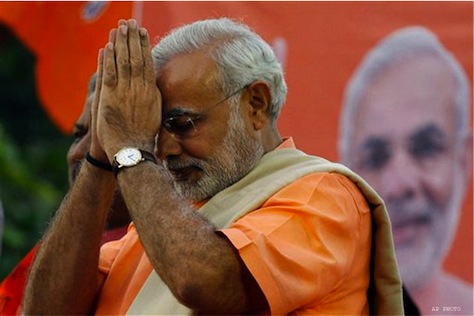Earlier this year, when Narendra Modi, the frontrunner to become India’s next prime minister, decided to run from Varanasi, a city that many in India consider to be India’s holiest, many of his supporters co-opted a Hindu chant, ‘har har Mahadev,’ a traditional greeting in Varanasi among Hindus.![]()
The chant praises the Hindu lord Shiva, also known as Mahadev, and it literally means, ‘rid us of pain,’ though it was once a battle cry of ancient Hindu kings.
Modi’s supporters co-opted the chant as ‘har har Modi,’ a turn of events that even left some Hindu scholars uncomfortable. Though Modi and other leaders in his party, the conservative, Hindu nationalist Bharatiya Janata Party (the BJP, भारतीय जनता पार्टी) eventually called on supporters to desist, it’s become the most notorious ‘dog whistle’ in a campaign where religious tension is bubbling fervently below the surface.
It also confounded worries among India’s religious minorities that they might be second-class citizens under a Modi government. The overwhelming majority of Indians are Hindu, including nearly 80.5% of the Indian population, largely as a result of the 1947 Partition that created the Muslim-majority Pakistan. But 13.4% of India’s population is Muslim — another 2.3% is Christian, another 1.9% is Sikh and another 0.8% is Buddhist. In a country of 1.236 billion people, that translates to over 165 million Muslims, and that’s a fairly large group of folks that could feel threatened by a potential Modi government.
For many Indians, the key question of this year’s national elections has less to do with development or economics but rather about a series of riots in 2002 that left at least 790 Indian Muslims, and possibly up to 2,000 Muslims, dead.
Those riots, which took place in Gujarat, were one of the first crises in the administration of a new chief minister, Narendra Modi, just four months on the job. Modi had succeeded Keshubhai Patel, another BJP chief minister whose rule faltered after the loss of several by-elections and charges of mismanagement of the relief efforts from a devastating 2001 earthquake in Gujarat.
Twelve years later, Modi’s response to those riots and the lack of clarity over his responsibility for the bloodletting is at the heart of the national election campaign. Suspicion that Modi subtly encouraged the violence has dogged him ever since. Though he’s been technically absolved by the Indian supreme court, the Gujarati riots prevented Modi from receiving a visa to enter the United States in the mid-2000s and Modi himself has refused to apologize for the tragedy that took place on his watch. even as Modi has increasingly used his economic stewardship of Gujarat as the basis of his presidential-style campaign.
So what actually happened? And why has it become so central to the current election campaign? Continue reading How the 2002 Gujarat riots became so important to the 2014 election
